|
|
|
Sort Order |
|
|
|
Items / Page
|
|
|
|
|
|
|
| Srl | Item |
| 1 |
ID:
116231
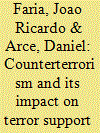

|
|
|
|
|
| Publication |
2012.
|
| Summary/Abstract |
This article presents a dynamic model in which counterterrorism policies have the potential to generate positive public support for terrorism via a backlash that may fuel terror recruitment. For an optimizing government aiming at maximizing security, this phenomenon produces a natural bound on proactive counterterror policy that is related to the dynamic path of conflict. Moreover, terror is a persistent phenomenon that requires patience on the part of the target government for optimal counterterror policies to be realized. Finally, the potential for backlash yields insights into the need for target governments to fight an information war to change public opinion regarding its own policies and the ultimate effect of terror attacks.
|
|
|
|
|
|
|
|
|
|
|
|
|
|
|
|
| 2 |
ID:
138779
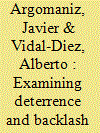

|
|
|
|
|
| Summary/Abstract |
Scholars are increasingly drawing on models and theories from the field of Criminology to offer new insights on terrorist violence. A particularly useful framework by LaFree, Dugan, and Korte works from the assumption that illegal behaviour can be affected by the threat and/or imposition of punishment. It sees the results of the government's intervention in terms of deterrence (state's repressive action leads to a reduction in terrorism violence), and backlash (state's repressive action leads to defiance and retaliation, and to an upsurge of terrorism violence). This article applies this model to a case study of the government's responses to Euzkadi Ta Askatasuna (ETA). It uses a variation of survival analysis technique—Series Hazard—to assess the impact of six major initiatives on the risk of new ETA attacks in the period from 1977 to 2010. Mostly, the results provide support for both backlash interpretations, although important questions regarding interpretation are raised.
|
|
|
|
|
|
|
|
|
|
|
|
|
|
|
|
| 3 |
ID:
186334
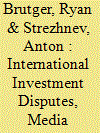

|
|
|
|
|
| Summary/Abstract |
This paper puts forth a theory explaining domestic backlash against international investment law by connecting media coverage—specifically the bias in the news media’s selection of international disputes—to public opinion formation towards international agreements. To test our theory, we examine both the content and effects of the media’s reporting on international disputes, focusing on the increasingly controversial form known as investor-state dispute settlement (ISDS). We find that newspaper outlets in both the United States and Canada have a bias in favor of covering disputes filed against their home country as opposed to those filed by home country firms. Using two national survey experiments fielded in the United States and Canada, we further find that the bias in news story selection has a strong negative effect on attitudes towards ISDS and related agreements, especially among highly nationalistic individuals.
|
|
|
|
|
|
|
|
|
|
|
|
|
|
|
|
| 4 |
ID:
146583


|
|
|
| 5 |
ID:
184717
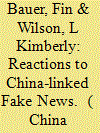

|
|
|
|
|
| Summary/Abstract |
China is accused of conducting disinformation campaigns on Taiwan's social media. Existing studies on foreign interventions in democratic societies predict that such disinformation campaigns should lead to increasing partisan polarization within Taiwan. We argue that a backlash effect, making Taiwan's citizens more united against China, is equally plausible. We conduct a survey experiment exposing participants to a real-life rumour and rebuttal to test these competing hypotheses. We find, at best, mixed evidence for polarization. Although neither rumour nor rebuttal mention China, there is consistent evidence of backlash against China. Most notably, participants across the political spectrum are more inclined to support Taiwanese independence after viewing the rumour rebuttal. These findings indicate that citizens may put aside partisanship when confronted with false news that is plausibly linked to an external actor. We conclude by discussing the broader applicability of our theory and implications for cross-Strait relations.
|
|
|
|
|
|
|
|
|
|
|
|
|
|
|
|
| 6 |
ID:
100956
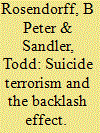

|
|
|
|
|
| Publication |
2010.
|
| Summary/Abstract |
This paper presents a game-theoretic model of suicide terrorism containing three agents: the terrorist leader; a targeted government; and potential terrorist supporters. Supporters join the terrorist group if they gain more from their participation than from their economic opportunities. Preemptive measures by the government can result in a backlash that encourages recruitment through new grievances. Suicide attacks can also lead to recruitment. Increases in preemption costs and/or economic opportunities can reduce the overall level of terrorism, while increasing the proportion of suicide to normal attacks. An increase in the effect of preemption on recruitment, or the propaganda effect of suicide bombings has the opposite effect of increasing normal and suicide attacks, but decreasing the proportion of suicide to normal attacks in the terrorist organization's strategy profile.
|
|
|
|
|
|
|
|
|
|
|
|
|
|
|
|
| 7 |
ID:
177783
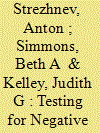

|
|
|
|
|
| Summary/Abstract |
The international community often seeks to promote political reforms in recalcitrant states. Recently, some scholars have argued that, rather than helping, international law and advocacy create new problems because they have negative spillovers that increase rights violations. We review three mechanisms for such spillovers: backlash, trade-offs, and counteraction and concentrate on the last of these. Some researchers assert that governments sometimes “counteract” international human rights pressures by strategically substituting violations in adjacent areas that are either not targeted or are harder to monitor. However, most such research shows only that both outcomes correlate with an intervention—the targeted positively and the spillover negatively. The burden of proof, however, should be as rigorous as those for studies of first-order policy consequences. We show that these correlations by themselves are insufficient to demonstrate counteraction outside of the narrow case where the intervention is assumed to have no direct effect on the spillover, a situation akin to having a valid instrumental variable design. We revisit two prominent findings and show that the evidence for the counteraction claim is weak in both cases. The article contributes methodologically to the study of negative spillovers in general by proposing mediation and sensitivity analysis within an instrumental variables framework for assessing such arguments. It revisits important prior findings that claim negative consequences to human rights law and/or advocacy, and raises critical normative questions regarding how we empirically evaluate hypotheses about causal mechanisms.
|
|
|
|
|
|
|
|
|
|
|
|
|
|
|
|
| 8 |
ID:
085770
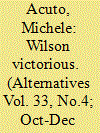

|
|
|
|
|
| Publication |
2008.
|
| Summary/Abstract |
Many authors have issued anxious warnings about a disturbing "backlash against democracy"-this in spite of the growing affirmation of democracy as an international standard against which other systems are measured. This article considers the role of democracy promotion, which is understood as activities aimed at assisting in consolidating, disseminating, and advocating democratic governance in this context. The theoretical framework in which the promotion debate occurs is highlighted in order to show how the concept of "democracy" is socially constructed and interpreted in different ways by the various promoters. The article examines the main targets of this activity (state structures and civil societies) and compares two major supporters of democracy (the European Union and the United States). On this basis, claims about a "democratic rollback" are challenged by reference to hybrid regimes that contrast the idea of democracy with that of civilization. The backlash is better understood as resistence to some of the methods of promotion and some promoters, rather than as being against democracy itself, and the article holds that the best way to promote good governance worldwide is through an oblique, cosmopolitan or European-style democracy that fosters the multiple and processual grounds on which democratic polities can flourish.
|
|
|
|
|
|
|
|
|
|
|
|
|
|
|
|
|
|
|
|
|